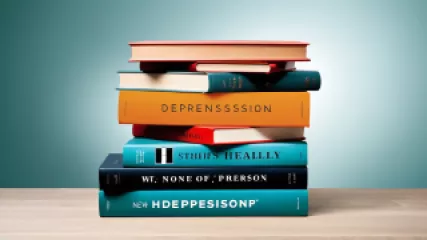Top 10 Self-Help Books for Managing Depression
Introduction
Depression is a common mental health condition that affects millions of people worldwide. It can be a debilitating illness, making it difficult for individuals to function in their daily lives. While therapy for depression and professional help are crucial, self-help resources can also play a significant role in managing symptoms and promoting recovery.
In this article, we have compiled a list of the top 10 self-help books for managing depression. These books offer valuable insights, practical strategies, and inspiration to help individuals cope with their depression and work towards recovery. Whether you are seeking guidance for yourself or looking to support a loved one, these books can serve as valuable tools on your journey.
1. "The Mindful Way through Depression" by Mark Williams, John Teasdale, Zindel Segal, and Jon Kabat-Zinn
This groundbreaking book combines mindfulness-based cognitive therapy (MBCT) with proven strategies to help individuals overcome depression. It provides step-by-step guidance on how to use mindfulness techniques to break free from negative thought patterns and cultivate a sense of well-being. The book also includes practical exercises and audio tracks to enhance the learning experience.
2. "Feeling Good: The New Mood Therapy" by David D. Burns
Considered a classic in the field of self-help for depression, "Feeling Good" offers practical techniques based on cognitive behavioral therapy (CBT). Dr. David D. Burns provides readers with tools to challenge negative thinking, manage emotions, and improve overall mood. The book also includes helpful exercises and worksheets to apply the concepts discussed.
3. "The Upward Spiral: Using Neuroscience to Reverse the Course of Depression, One Small Change at a Time" by Alex Korb
Neuroscientist Alex Korb explores the connection between depression and brain chemistry in "The Upward Spiral." The book offers practical advice on how to make small changes in daily life that can have a significant impact on mental health. Korb's insights help readers understand the neuroscience behind depression and empower them to take control of their own well-being.
4. "Lost Connections: Uncovering the Real Causes of Depression – and the Unexpected Solutions" by Johann Hari
Johann Hari delves into the root causes of depression in "Lost Connections." The book challenges conventional wisdom and explores alternative approaches to understanding and treating depression. By examining social, cultural, and environmental factors, Hari offers a fresh perspective on the condition and provides hope for those seeking effective solutions.
5. "The Depression Cure: The 6-Step Program to Beat Depression without Drugs" by Stephen S. Ilardi
Dr. Stephen S. Ilardi presents a comprehensive program for depression recovery in "The Depression Cure." The book combines evidence-based strategies from various fields, including psychology, nutrition, and exercise science. With a focus on lifestyle changes, Dr. Ilardi offers readers a step-by-step approach to overcoming depression naturally.
6. "Reasons to Stay Alive" by Matt Haig
In this deeply personal and inspiring memoir, Matt Haig shares his own journey through depression in "Reasons to Stay Alive." Haig offers a raw and honest account of his experiences and provides valuable insights into the challenges faced by those living with depression. The book offers hope and encouragement to readers, reminding them that they are not alone in their struggles.
7. "Undoing Depression: What Therapy Doesn't Teach You and Medication Can't Give You" by Richard O'Connor
Richard O'Connor, a psychotherapist and author, explores the multifaceted nature of depression in "Undoing Depression." The book goes beyond traditional therapy approaches and medication to provide readers with practical strategies for long-term recovery. O'Connor's compassionate and informative writing style makes this book a valuable resource for individuals seeking a comprehensive understanding of depression.
8. "The Dialectical Behavior Therapy Skills Workbook for Depression: Using DBT to Regain Control of Your Life" by Sheri Van Dijk
Sheri Van Dijk's workbook offers a practical guide to using dialectical behavior therapy (DBT) skills to manage depression. "The Dialectical Behavior Therapy Skills Workbook for Depression" provides readers with tools to regulate emotions, improve interpersonal relationships, and develop healthy coping mechanisms. The book includes worksheets, exercises, and real-life examples to help individuals apply DBT techniques in their daily lives.
9. "The Noonday Demon: An Atlas of Depression" by Andrew Solomon
In this comprehensive exploration of depression, Andrew Solomon combines personal anecdotes, scientific research, and cultural analysis in "The Noonday Demon." The book offers a profound understanding of the condition and its impact on individuals and society. Solomon's compassionate and insightful writing style makes this book a must-read for anyone seeking a deeper understanding of depression.
10. "Living with a Black Dog: His Name Is Depression" by Matthew Johnstone
"Living with a Black Dog" by Matthew Johnstone uses a powerful metaphor to depict depression as a black dog. The book combines captivating illustrations with concise text to provide readers with a visual representation of the condition. It offers practical advice and strategies for managing depression, making it an accessible resource for individuals of all ages.
Conclusion
Self-help books can be valuable resources for individuals seeking to manage their depression and promote their recovery. The top 10 books on this list offer a range of approaches, from mindfulness-based techniques to cognitive behavioral strategies, providing readers with a variety of tools to support their mental health journey. Remember that while self-help books can be beneficial, they are not a substitute for professional help. If you or someone you know is struggling with depression, it is essential to seek therapy for depression and consult with a mental health professional. With the right support and resources, individuals can find hope, healing, and a path towards a brighter future.






